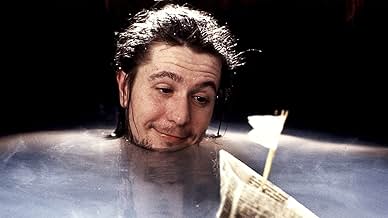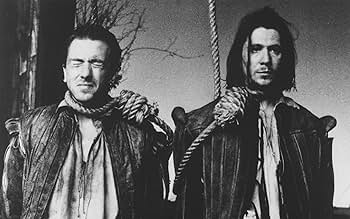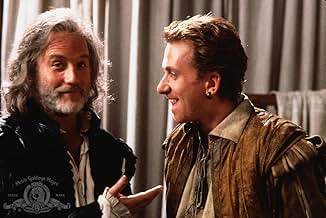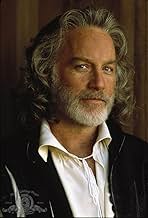Zwei Nebenfiguren aus dem Stück "Hamlet" stolpern umher, ohne sich ihres geskripteten Lebens bewusst zu sein und ohne von diesem abweichen zu können.Zwei Nebenfiguren aus dem Stück "Hamlet" stolpern umher, ohne sich ihres geskripteten Lebens bewusst zu sein und ohne von diesem abweichen zu können.Zwei Nebenfiguren aus dem Stück "Hamlet" stolpern umher, ohne sich ihres geskripteten Lebens bewusst zu sein und ohne von diesem abweichen zu können.
- Auszeichnungen
- 3 Gewinne & 2 Nominierungen insgesamt
- Tragedian
- (as Srdjan Soric)
- Laertes
- (as Sven Medvesck)
Empfohlene Bewertungen
The characters spend the entire film coming to terms with their existence. Shakespeare didn't provide any detailed character development of either Rosencrantz or Guildenstern, and as such, they are left confused as to the purpose of their own existence.
The film also looks at the concept of a predetermined destiny. Rosencrantz and Guildenstern's fate is already determined before the film begins. And although they play an important role in one of the greatest stories ever told, they are completely unaware of their destiny; they are merely victims of circumstance.
I should also note that the constant banter between the two characters (specifically in their 'Game of Questions') is pure quality.
Hamlet is the same. It was never really finished, being so large a conception. Shakespeare tinkered and added over decades. So what Stoppard does here is expand Hamlet by shrinking it. The plot is only glimpsed, but that part was always incidental anyway. The play is about reasoning, and when things are real and when not, and about what element of reality is causal. So instead of giving us the language, Stoppard seizes on one device, the play within the play.
In the raw Hamlet, this is pretty rich, but Stoppard weaves new dimensions of inversion and self-reference. There are at least four levels of play here, and we keep switching about, together with most of the characters. This is not just amusing, but elaborates on `Hamlet,' when is fate real? would it change if we could see the larger clockworks of the universe? does language (specifically query) aid in this endeavor? considering that, are ideas tied to time and fate? This last point is comically illustrated as one of the pair (they don't know who is who) keeps `stumbling' on great ideas, which then vanish.
The play (Stoppard's first) seems to have been his one excellent work, followed by the mundane. Some are unhappy because the film is not so frantic as the 1967 play, but I think that is because there is a different dynamic with a film audience than a stage audience. Fewer tricks can be played. But this is a wonderful solution to the problem of language in film: it is just not cinematic, so best to exploit the dissonance.
There's risk here. The film as film is not great, so set that aside. And the notions are dangerously sophomoric. But that's what makes the whole thing so darned funny. Some critics (notably the normally intelligent Stanley Kauffmann) think Roth and Oldham are poor. But this is a strange sort of acting demand, one for which no measures exist: part surreal, part comic (in different traditions, half Monty Python, half Abbot and Costello) and part tragic confusion. They reward my trust and that's what matters I think. Dreyfus is supposed to be over the top, and he complies.
In the great Hamlet sweepstakes, many recommend seeing Mel Gibson and then Gwyneth Paltrow. I suppose that's a colorful route. But the real sense of what this is all about comes through with more real reward via Branagh and then this clever film.
It's weird and it absolutely isn't going to work for some people but I love this one. It's so unique and fun, creative and inventive and I try to give props to any movie setting out to be as different as this one especially when it actually succeeds at what it's trying to do. Strong recommend here, whether you're familiar with Hamlet or not, though a loose understanding of the play would likely be beneficial.
Wusstest du schon
- WissenswertesOriginally, the two leads (who appropriately spend the movie mixing up their own names) were cast the other way around.
- PatzerThroughout the movie there are scenes where day suddenly changes to night and vice versa. This is a running gag of Tom Stoppard plays which often have "time jumps" written into the stage directions.
- Zitate
Rosencrantz: Do you think Death could possibly be a boat?
Guildenstern: No, no, no... Death is "not." Death isn't. Take my meaning? Death is the ultimate negative. Not-being. You can't not be on a boat.
Rosencrantz: I've frequently not been on boats.
Guildenstern: No, no... What you've been is not on boats.
- VerbindungenEdited into Spisok korabley (2008)
Top-Auswahl
- How long is Rosencrantz & Guildenstern Are Dead?Powered by Alexa
Details
- Erscheinungsdatum
- Herkunftsländer
- Sprache
- Auch bekannt als
- Rosencrantz y Guildenstern han muerto
- Drehorte
- Produktionsfirmen
- Weitere beteiligte Unternehmen bei IMDbPro anzeigen
Box Office
- Bruttoertrag in den USA und Kanada
- 739.104 $
- Eröffnungswochenende in den USA und in Kanada
- 24.004 $
- 10. Feb. 1991
- Weltweiter Bruttoertrag
- 739.104 $
- Laufzeit1 Stunde 57 Minuten
- Farbe
- Seitenverhältnis
- 1.85 : 1
Zu dieser Seite beitragen




























